MARSHAL
ZHUKOVS
GREATEST
BATTLES
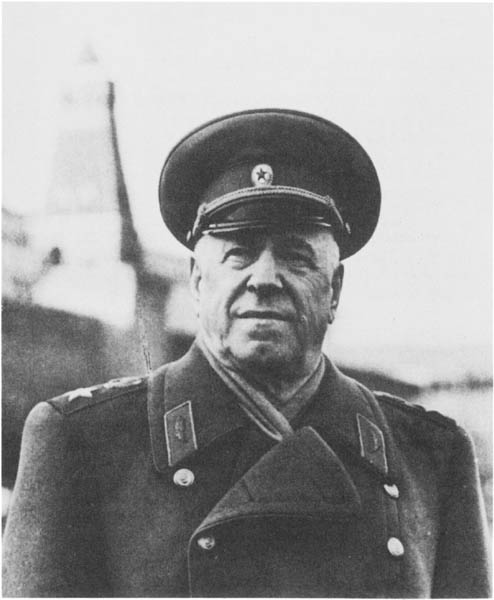
Tass from Sovfoto
MARSHAL GEORGI K. ZHUKOV
New Introduction
and Biographical Record by
DAVID M. GLANTZ
Edited with a Preface
and Explanatory Comments by
HARRISON E. SALISBURY
Translated from the Russian by
THEODORE SHABAD

MARSHAL
ZHUKOVS
GREATEST
BATTLES
BY
GEORGI K. ZHUKOV
Publishers Note: The portions of the Marshal Zhukov articles here translated into English are based upon the Russian text appearing in Voyenno-Istoricheskii Zhurnal, published by the Ministry of Defense in Moscow in June 1965, August, September, and October 1966, and August and September 1967; and in Stalingradskaya Epopeya published by the Military Publishing House in Moscow in 1968. The original articles are in the public domain.
First Cooper Square Press edition 2002
This Cooper Square Press paperback edition of Marshal Zhukovs Greatest Battles is an unabridged republication of the edition first published in New York in 1969, with the addition of a new introduction and a biographical record. It is reprinted by arrangement with HarperCollins Publishers, Inc.
Copyright 1969 by Harper & Row Publishers, Inc.
Foreword and explanatory comments copyright 1969 by Harrison E. Salisbury
New introduction and biographical record copyright 2002 by David M. Glantz
Maps by Jean Paul Tremblay
All rights reserved.
No part of this book may be reproduced in any form or by any electronic or mechanical means, including information storage and retrieval systems, without written permission.
Published by Cooper Square Press
A Member of the Rowman & Littlefield Publishing Group
200 Park Avenue South, Suite 1109
New York, New York 10003-1503
www.coopersquarepress.com
Distributed by National Book Network
Library of Congress Cataloging-in-Publication Data Available.
ISBN 978-0-8154-1098-0
 The paper used in this publication meets the minimum requirements of American National Standard for Information SciencesPermanence of Paper for Printed Library Materials, ANSI/NISO Z39.481992.
The paper used in this publication meets the minimum requirements of American National Standard for Information SciencesPermanence of Paper for Printed Library Materials, ANSI/NISO Z39.481992.
Manufactured in the United States of America.
Contents
BY DAVID M. GLANTZ
BY HARRISON E. SALISBURY
Introduction to the Cooper Square Press Edition
The heroic figure of Marshal Georgi Konstantinovich Zhukov, the Red Armys Greatest Captain of the Soviet Unions Great Patriotic War, strides like a colossus across the pages of Russian history. He is portrayed as the Red Armys most illustrious military commander and as the architect of the Soviet Unions signal victory over Hitlers vaunted Wehrmacht in the most terrible war that mankind has endured. Today, the ignominious demise of the Soviet Union in 1991 has propelled Zhukovs stature to even more grandiose proportions. The countrys unexpected, precipitous fall and the associated revelations of Communisms crimes, which savaged the reputations of entire generations of Soviet political and military heroes, left a yawning vacuum that the famous Zhukov now fills. He has become the sole remaining icon of Russias twentieth century past.
Zhukovs historical stature and military reputation reflects the tortuous history of the state that he served so loyally. As the perceptive Harrison E. Salisbury noted in his 1969 introduction to Marshal Zhukovs Greatest Battles:
History in Russia should be published in loose-leaf books so that pages can be extracted and new ones inserted. Zhukov had been a hero during the war. He became an unperson with the wars end. He reemerged as a hero upon Stalins death. He vanished from the printed page in 1957. With Khrushchevs fall he came back into print.... Comparison of the Zhukov accounts reveals discrepancies, changes, omissions, and inclusions, which reflect not the Marshals views, but the imposition of higher Communist Party censorship.
In Soviet historiographyand to a lesser extent elsewherethe victors record the history of the struggles in which they prevail. This has meant accentuating victories and understating, or in some cases, utterly ignoring defeats as the times dictate. Furthermore, in the case of totalitarian states such as the Soviet Union, historians must write and interpret history within the context of current internal political relationships. Accordingly, the interpretation of past victories and defeats, as well as the reputations of wartime military and political leaders, depends largely on whom power rests at any given time and how those in power were associated with those victories and defeats. In short, political sensibilities have forced Soviet military historians to emphasize, obscure, or reinterpret major portions of the war to protect the reputation of the Soviet state or its current leaders.
In Stalins day, recorded history was only a pale reflection of the wars real course, replete with a litany of the Red Armys victories and a fawning expos of the dominant role the Generalissimo played in their achievement. After Stalins death in 1953, historical candor ebbed and flowed in consonance with who was inor outof power and who was inor outof favor. This process was punctuated in the early 1960s and late 1980s by sharp bursts of historical glasnost (publicity), first mandated by Khrushchev during his program of de-Stalinization and later by Gorbachev, as he attempted in vain to revitalize the decaying Soviet state. Despite these periods of increased openness and greater candor, Soviet history has remained fettered by censorship. Today, more than ten years since the demise of the Soviet Union and the birth of democratic Russia, forty percent of actual Soviet wartime military operations remain obscure or totally forgotten. Given the incomplete operational record and Russian congenital preoccupation with maintaining or denigrating reputations as political need dictates, the reputations of the Soviet armys wartime military commanders require fundamental revision. Since his is the leading star in the galaxy of senior wartime commanders, Marshal Zhukovs reputation requires reevaluation before this historical cleansing process can begin.
As was the case with all senior Red Army generals, Zhukovs wartime reputation reflected postwar political realities. After the wars end, an ever-suspicious Stalin relegated Zhukov to relative obscurity by exiling him to command the Odessa and Ural military districts from 1946 through 1953. At the same time, Stalin ordered historians to expunge Zhukovs name from all written records of the war. After Stalins death in 1953, Zhukovs reputation rebounded as Stalins successors rehabilitated him as a counterweight to their former dictator. His reputation as a wartime commander soared, and he became Minister of Defense largely as reward for the constructive role that he played in Khrushchevs rise to power. After 1957, however, the vagaries of Soviet history struck once again, as a suspicious Khrushchev relegated Zhukov to obscurity. The tortuous twists and turns of Soviet history continued as he reemerged triumphant after Khrushchevs ouster from power in 1964. Zhukovs reputation grew steadily in the 1970s and 1980s, finally reaching god-like proportions in the final days of the Soviet Union and in the first decade of the fledgling Russian Federations existence. Despite Zhukovs ultimate victory, like the war during which he served, the full measure of his service and, by extension, his reputation, remains imperfectly understood.


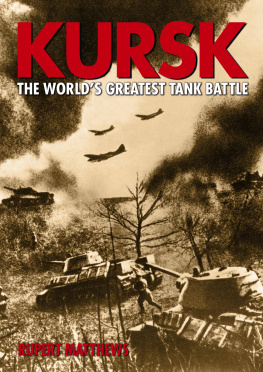
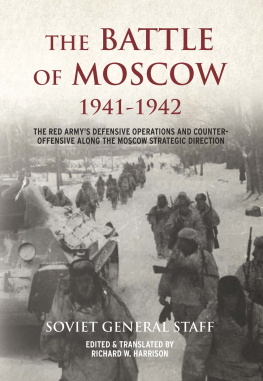
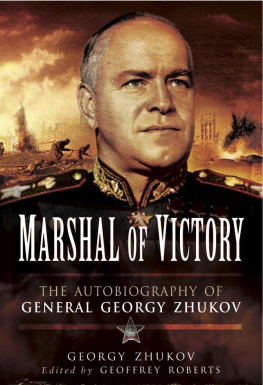
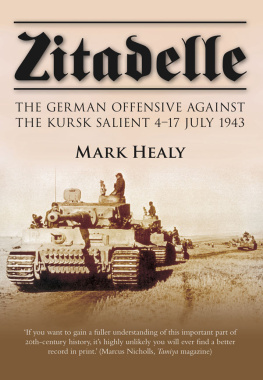



 The paper used in this publication meets the minimum requirements of American National Standard for Information SciencesPermanence of Paper for Printed Library Materials, ANSI/NISO Z39.481992.
The paper used in this publication meets the minimum requirements of American National Standard for Information SciencesPermanence of Paper for Printed Library Materials, ANSI/NISO Z39.481992.